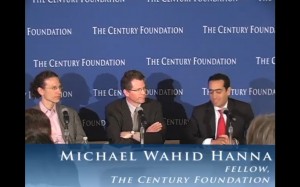Michael Hanna on Egypt
 Michael Hanna at The Century Foundation has a smart oped in The Christian Science Monitor about the steps necessary to translate Egypt’s revolution into lasting reforms. He argues that the rushed timeline imposed by the military might thwart the systemic changes needed to institute a credible constitution and initiate electoral politics.
Michael Hanna at The Century Foundation has a smart oped in The Christian Science Monitor about the steps necessary to translate Egypt’s revolution into lasting reforms. He argues that the rushed timeline imposed by the military might thwart the systemic changes needed to institute a credible constitution and initiate electoral politics.
Progress based solely on a hasty electoral transition would be an illusion – which might undercut efforts at real reform. Instead of accepting a transition process implemented and dictated solely by the armed forces,Egypt’s opposition should remain united in seeking immediate actions that will preclude diversion to military-led governance, while allowing for a more realistic transitional period.
The country’s opposition groups are keen to ensure that the armed force’s custodianship is, in fact, temporary, and not a prelude to consolidation of a revamped, military-led regime. This concern – and broader and well-justified concerns about a counter-revolution – are understandable based on Egypt’s history and recent developments. Yet, these very same concerns could lead to support for a transition process that will actually undermine the core goals of the Egyptian uprising and subvert thorough reform. A six-month timetable for popular elections, as was announced by the Egyptian military, will dictate that reform in the interim period will be shallow and that even free and fair elections will not be an opportunity for true representational politics. Read the rest here.
We had a panel discussion at The Century Foundation last week where we discussed some of the implications of the revolution for Egypt going forward and for the Arab world as a whole. My favorite part of the evening came when the Yemeni ambassador to the U.N. Abdullah Al-Saidi diagnosed the central problem of the region as “leaders who have tried to transform republics into monarchies” — a malady from which he did not exempt his own country (you can watch the q & a here). That’s a fair enough way to summarize the ills of regimes in Yemen, Egypt, Libya, and Syria. It doesn’t address the failure to govern, which is at root what plagues all the Arab states, including those that are avowedly hereditary monarchies (Saudi Arabia, Bahrain, Jordan, Morocco). You can watch the event at The Century Foundation here.

